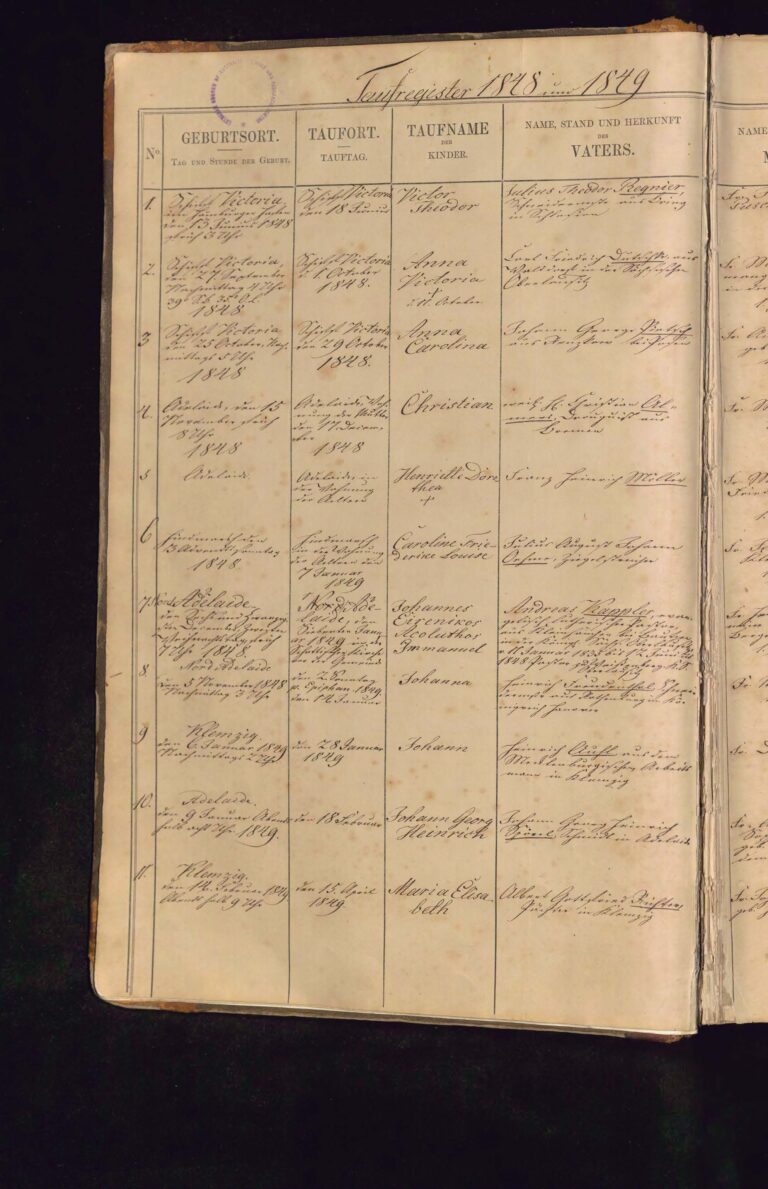Genealogy and Family History
Lutheran Archives holds a wealth of genealogical and family history information in its collection.
Genealogical information can be found in registers of pastoral acts, parish papers, church periodicals, post World War II migrant records, and other documents. Names from these records are added into our Names Index, which currently contains over 580,000 entries.
The Lutheran Archives Names Index (unrestricted entries) is freely accessible to download as an MS Excel spreadsheet (see below). Fees apply to obtain copies of records.
In some cases, more detailed information about a family’s involvement in the Lutheran church may be documented in other parts of the collection – for instance, in our Congregation Records, Synod and Department Records, and Personal Papers.
Lutheran Archives also holds over 700 published and unpublished family histories which are available to read at in our Research Room (not available for loan). We often have published family histories available for purchase (An online book shop is coming soon!
If you are ready to visit, you can make a request via our Contact Page.
REGISTER ENTRIES – RECORD TYPES
ba = baptism
cf = confirmation
ma = marriage
br = burial
fr = family record
pr = personal record
pwm = post-WWII migrant record
REGISTER ENTRIES – SURNAMES
The search results can contain surnames other than what you have specifically searched for.
This occurs when your requested surname has been indexed as an ‘alternative’ surname: most commonly a maiden or previous marriage name. You will see the ‘primary’ surname listed in the search results.
REGISTER ENTRIES – CHRISTIAN NAMES
It was common practice for early Lutherans to have 2 or 3 Christian-names.
They were often known and called by the last of their Christian names. You might find a record indexed under that name only. For example, Friedrich Samuel Wilhelm Kuchel appears in his burial record as ‘Willhelm Kuchel’.
REGISTER ENTRIES – YEAR
The year column in the search report generally (but not always!) refers to the beginning year of the register, rather than the specific year of the event.
A good guide to work out which year ‘system’ the register has used: if it’s the 50th marriage or event for a ‘year’ – you can probably assume the year column is not the actual year of the marriage/event.
LANGUAGE
Most of the parish registers are written in Kurrentschrift German until the 1920s. This is an old cursive script which few people can read today.
We are able to provide you with transcriptions and translations of individual register entries for a small fee. See Requesting Records below for these details.
BUILDING FAMILY CONNECTIONS
Can’t find a particular ancestor on the index? Families generally worship with their family – if you can locate one relevant ancestor it’s worth looking at all the surname entries in that register. Your missing person might turn up!
Using all the details in a register entry is vital to find and build connections between your ancestors. Noting who the Godparents/Sponsors are might give you the crucial link to connect two families together.
40-year PRIVACY Restriction
We do not publicly release records that are less than 40 years old (i.e. as of 2023, all records created later than 1983 are restricted). However, we do hold and index recent records, and periodically release records as they become unrestricted.
If you need to obtain a copy of your own baptism record from within that timeframe (e.g. for marriage within the Catholic or Orthodox churches), please contact us directly.
REQUESTING RECORDS
Once you have identified records of interest on the Names Index, you can come to our premises to view the register entries yourself, or you can request that we provide you with digital scans for $8 per entry, and/or transcriptions + translations for $8 per entry.
To request copies of records, complete a Request Form with details of surname, Christian name, record type, church name, register name, year and record number as provided in the search results.
SEARCH THE RECORDS
Scroll down to see a listing of all indexed registers and their date range.
Search the Names Index (registers of Pastoral Acts & more)
Search via SURNAME for baptisms, confirmations, marriages, burials and more. Notes: *1: results will usually have different surnames appear at the beginning of the index - these are the results for when your requested surname is an alternative name (eg a former married name) - these records are still relevant! * *2. records under 40 years won't appear on the search results - please contact us directly for access to these records.* *3: as at 7th March 2024: we are having issues with this search working correctly (it's a new website and teething issues are expected) - it is best for you to email us at lutheran.archives@lca.org.au for a surname report*
Search registers of pastoral acts
Search via SURNAME for baptisms, confirmations, marriages, burials and more. NB records under 40 years won't appear on the search results - please contact us directly for access to these records.
Search published family histories
Search for: surname; village of emigration; ship or year of migration.
NAMES INDEX
This spreadsheet lists the names that we have indexed from records in our collection, including types of records, date, and location. Current version 31 March 2025. Due to the size of this file, it will not open in a browser – please download the file to view it.
Notes:
- It only includes unrestricted entries (more than 40 years old and/or no cultural restrictions). You can request a search of restricted records by contacting Lutheran Archives.
- The date often refers to the earliest date in the register rather than the date of an event
- Event codes are ba – baptism, ma – marriage, cf – confirmation, br – burial, pr – personal record, fr – family record, ann – anniversary notice, ob – obituary, bth – birth, civ – civil record, cl – cemetery lease, ea – education attendance, gr – graduation, mb – membership record, hc – holy communion, od – ordination, oth – other record, pwm – post war migrant, sr – shipping record, trn – transfer.
To download the spreadsheet, click on the green button below.
Register list
These PDFs list the registers that we have indexed our collection, including types of records, date ranges and restrictions. Please note that in previous decades, photocopies of separate original registers were sometimes compiled together into access volumes and indexed as a single register. This means that some congregations’ original registers will not appear on the following lists, as the registers are incorporated into access volumes under a different name. We have recently received a grant from the Community and Heritage Grant scheme to address this, and will be working over the course of 2024 to accurately digitise and index all registers and records.


![IMG_E2316[1]](https://lutheranarchives.lca.org.au/wp-content/uploads/2023/12/IMG_E23161-768x1170.jpg)
